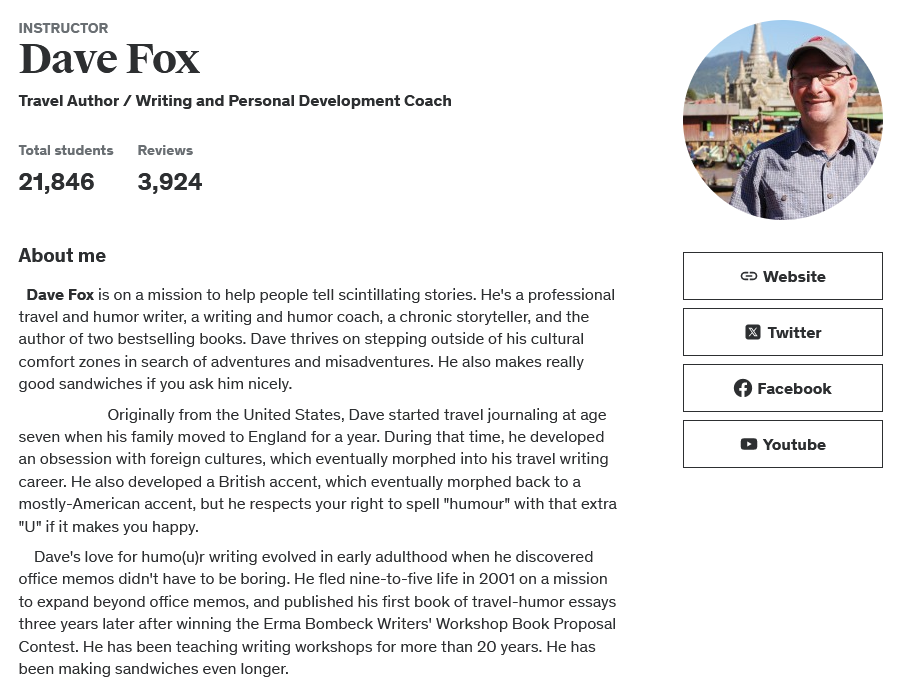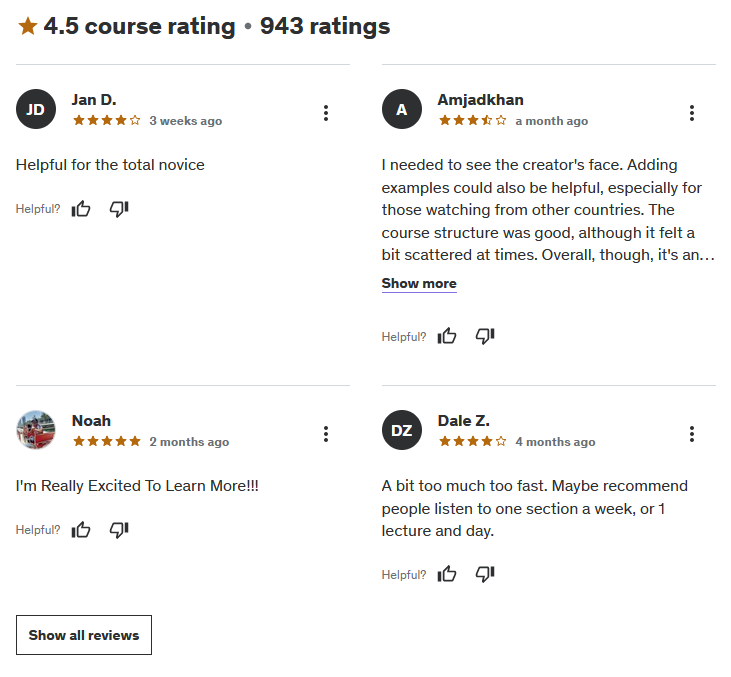Ever wanted to make milk come out of people’s noses with your words? Not literally, but you get the gist. If so, Dave Fox’s Udemy course, “Humor Writing: How to Think, Write, Speak, and Be Funnier!” might just be your golden ticket. So, grab your notebook (or open a new doc), and let’s dive into what makes this course a must-try for aspiring humorists and anyone looking to add a dash of laughter to their writing or speaking.
The first thing that caught my eye was the course description. It’s a blend of a promise and a playful warning: humor isn’t just for the “chosen ones” with a natural knack for making people chuckle. Dave Fox, our captain on this laughter-filled journey, insists humor and writing are skills anyone can develop. And boy, does he have a plan to prove it.
Instructor Reputation: A Deep Dive into Dave Fox’s World
When you sign up for a course, especially one as subjective and nuanced as humor writing, the instructor’s credentials, personality, and teaching style are not just important; they’re everything. Dave Fox is not just the man behind the curtain; he’s front and center, imbuing every lesson with his extensive experience, wit, and a palpable passion for teaching. Let’s break down what makes Dave Fox the ideal mentor for this comedic journey.

Background and Credentials
Dave Fox is a name that resonates with many in the travel and humor writing spheres. His journey is not just a list of accomplishments but a mosaic of experiences that enrich his teaching. Originally from the United States, Dave’s adventure began at the tender age of seven when his family moved to England. This early exposure to a new culture sparked his obsession with travel, a theme that has been a constant in his life and career.
Dave’s professional background is as diverse as it is impressive. From anchoring for Public Radio to guiding tours across Europe for Rick Steves, his experiences have afforded him a unique perspective on storytelling and humor. His stint as an international cruise ship lecturer and his adventurous spirit led him to explore the nuances of humor across different cultures, further deepening his understanding and mastery of the craft.
Writing and Humor Coaching
What sets Dave apart is not just his ability to write humor but his eagerness to teach others to do the same. With over 20 years of teaching writing workshops under his belt, Dave has honed his skills as an educator, making complex ideas accessible and engaging. His approach is hands-on, focusing on exercises that push students to explore and expand their comedic boundaries.
Dave’s accolades include winning the Erma Bombeck Writers’ Workshop Book Proposal Contest and publishing bestselling books on travel and humor. These achievements underscore his expertise and validate his methods, both as a writer and a teacher.
Approachability and Feedback
Students of the course often highlight Dave’s approachability and the personalized feedback he provides. This feedback is crucial in a subject as subjective as humor, where understanding the nuances of why something works (or doesn’t) can be the key to improvement. Dave’s commitment to his students is evident in the glowing testimonials that praise his ability to provide insightful, constructive feedback as if he were right there beside them.
Course Structure: A Blueprint for Laughter
The structure of “Humor Writing: How to Think, Write, Speak, and Be Funnier!” is a carefully crafted journey designed to take you from chuckle to full-blown guffaw. Dave Fox doesn’t just throw information at you; he guides you through a meticulously planned curriculum that builds upon each lesson, ensuring a solid foundation before moving on to more advanced concepts.

Starting with the Basics
The course kicks off with an exploration of the universal elements present in all humor, establishing a foundation upon which the rest of the course is built. This starting point is crucial for beginners and experienced writers alike, as it sets the tone and approach for the lessons that follow. By beginning with the basics, Dave ensures that all students, regardless of their starting skill level, have a common understanding of what makes something funny.
Comprehensive Coverage
Each section of the course is designed to cover a different aspect of humor writing, from the mechanics of joke writing to the subtleties of word choice and timing. Dave’s curriculum includes writing humor columns, personal essays, and creative non-fiction, but the skills taught are applicable to a wide range of writing forms. This comprehensive approach ensures that students can apply what they’ve learned in various contexts, from stand-up and sketch comedy to writing fiction, non-fiction, and even engaging social media posts.
Practical Exercises and Real-World Examples
What truly sets this course apart are the practical exercises and the use of real-world examples from comedy legends. These exercises are not just theoretical; they’re designed to be applied, encouraging students to actively engage with the material and put their new skills to the test. The inclusion of examples from popular culture, like “Saturday Night Live” sketches and iconic “Seinfeld” episodes, serves a dual purpose: it illustrates the concepts being taught and demonstrates how these techniques are used by the pros.
Interactive and Engaging Learning
Dave’s teaching style is interactive and engaging, making extensive use of video lessons and external resources. This multimedia approach caters to different learning styles and keeps the content dynamic and interesting. The course is structured to encourage participation and interaction, not just with the material but also with Dave and fellow students. This interactive environment fosters a sense of community and support among participants, enhancing the learning experience.
Continuous Improvement and Feedback Loop
A unique aspect of the course structure is the emphasis on feedback and continuous improvement. Dave encourages students to share their work, receive feedback, and learn from each other. This feedback loop is integral to the learning process, allowing students to identify strengths and areas for improvement in their humor writing. Dave’s personal involvement in providing feedback ensures that students receive expert advice tailored to their individual needs and writing styles.
In conclusion, the course is thoughtfully designed to guide students through the intricacies of humor writing. From the solid foundation laid at the beginning to the advanced techniques and practical exercises that follow, Dave Fox has created a comprehensive roadmap for anyone looking to infuse humor into their writing or speaking engagements. With his extensive experience, engaging teaching style, and commitment to student success, Dave is the ideal mentor for this comedic journey.
Content Quality: Unpacking the Laughter Toolkit
The essence of a great course lies not just in its structure or the reputation of its instructor but in the quality of its content. “Humor Writing: How to Think, Write, Speak, and Be Funnier!” excels in this area, offering a treasure trove of insights, techniques, and practical exercises that stand out for their depth, relevance, and engagement. Let’s delve into what makes the content of this course not just good, but exceptional.

Depth and Breadth
One of the most striking aspects of the course’s content is its comprehensive coverage of humor writing. Dave Fox doesn’t just scratch the surface; he dives deep into the mechanics of what makes things funny, exploring the nuances of humor that can turn a simple story into a laugh-out-loud adventure. The course covers a broad spectrum of humor writing, from crafting punchlines to integrating humor into various forms of writing, including fiction, non-fiction, and even professional communication like office memos or cover letters.
Practicality and Application
What sets this course apart is its focus on practical application. Each lesson is designed not just to inform but to empower students to apply what they’ve learned. Through targeted exercises, students are encouraged to practice techniques, experiment with timing, word choice, and narrative structure, and receive feedback on their efforts. This hands-on approach ensures that students can see tangible improvements in their writing, making the learning process both rewarding and effective.
Quality of Examples
The course is peppered with examples from well-known comedians, humorists, and comedy shows, which serve as excellent illustrations of the concepts being taught. These examples are not just entertaining; they’re educational, offering students a chance to analyze and understand the mechanics of successful humor. By breaking down why certain jokes work and others don’t, Dave Fox provides students with the tools to critically assess and improve their own writing.
Engagement and Entertainment
Learning about humor should be fun, and this course delivers on that front. Dave Fox’s teaching style is engaging and entertaining, making each lesson feel like a conversation with a knowledgeable friend rather than a dry lecture. This approach keeps students engaged and makes the learning process enjoyable, which is crucial for a subject as dynamic and subjective as humor.
Overall Course Rating: 9/10
After thoroughly reviewing “Humor Writing: How to Think, Write, Speak, and Be Funnier!“, it’s clear that this course is a standout offering in the realm of online education, particularly for those looking to sharpen their humor writing skills or inject more laughter into their work. Considering the instructor’s expertise, the well-structured curriculum, the high-quality content, and the practical, engaging teaching methods, I would rate this course a solid 9 out of 10.

Strengths
- Comprehensive Coverage: The course covers all bases, from the fundamentals of humor to advanced techniques, making it suitable for a wide range of learners.
- Practical Exercises: The emphasis on practical application through exercises and real-world examples greatly enhances the learning experience.
- Engaging Delivery: Dave Fox’s ability to deliver content in an engaging and entertaining way makes learning a pleasure, not a chore.
Areas for Improvement
- Pacing for Beginners: While the course is comprehensive, beginners might find the pace a bit challenging. Additional resources or optional sessions for those new to writing could make the course even more accessible.
- Subjectivity of Humor: Given the subjective nature of humor, not every example or joke will resonate with every student. More diversity in humor styles and examples could broaden the appeal.
Overall, this course offers invaluable insights for anyone looking to enhance their humor writing skills or simply add a touch of humor to their public speaking or writing across genres. Dave Fox not only shares his extensive knowledge but does so in a way that’s accessible, practical, and, most importantly, fun. Whether you’re an aspiring comedian, a writer looking to diversify your skills, or someone who just wants to be the funny person in your friend group, this course has something to offer.
With its minor areas for improvement far outweighed by its strengths, this course stands as a premier choice for anyone looking to navigate the complex, rewarding world of humor writing.



